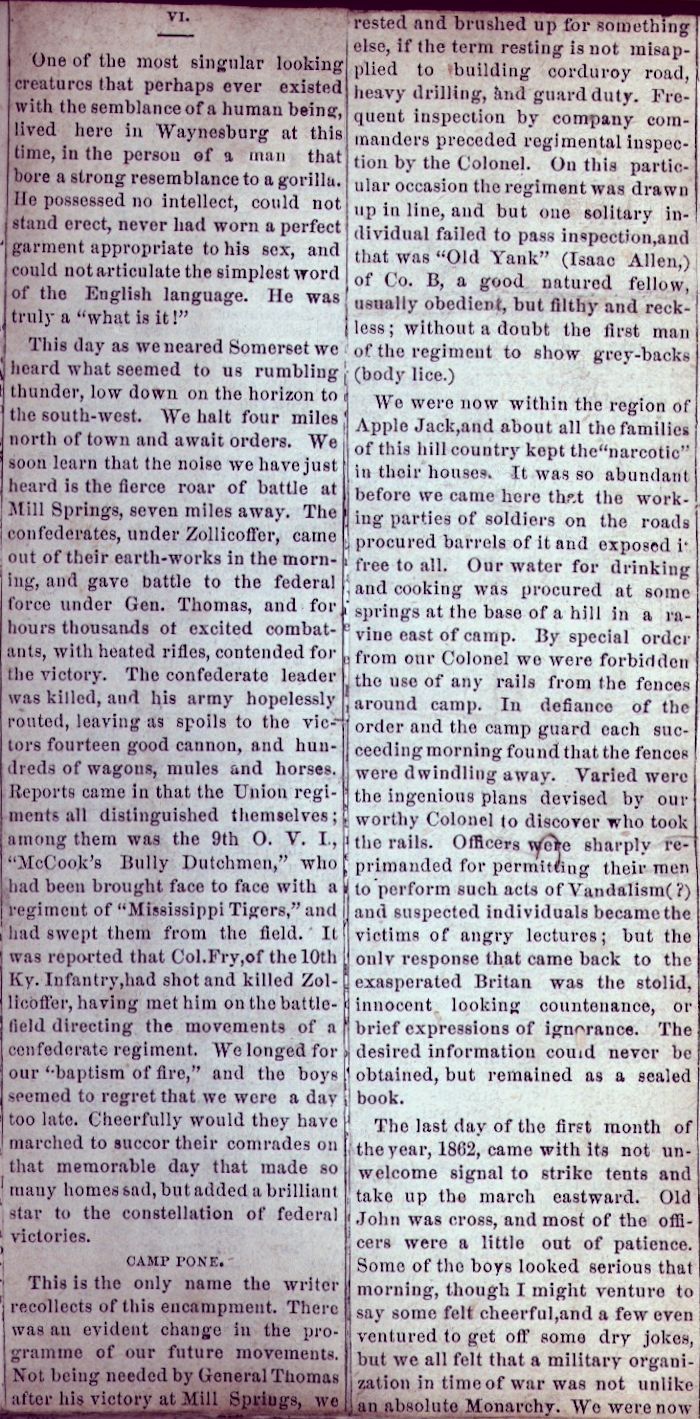| Camp & Field Page 8 | Camp & Field Index Page | 16th OVI Home Page | Camp & Field Page 10 |
The Camp & FieldArticles by Theodore Wolbach |
 Cpl. Theodore D. Wolbach |
The following image is taken from a book titled "Mortality and Statistics of the Census of 1850" in which it is believed retired Captain Rezin H. Vorhes, Company H, pasted over the pages a series of articles written by Cpl. Theodore D. Wolbach, Company E, titled "Camp and Field" and published, by chapter, in the Holmes County (Ohio) Republican newspaper from February 24, 1881 to August 17, 1882. The articles tell the story, in great detail and color, of the 16th OVI, from the inception of the 3-year regiment in October, 1861, through all its camps, battles and marches until it was disbanded on October 31, 1864. The articles pasted in the Vorhes book cover the first 35 chapters, published through October 20, 1881. All the remaining chapters were recently found in a Holmes County library by researcher Rob Garber who obtained copies, performed the transcriptions and provided to this website and which are also presented here, thus providing the complete work by Theodore Wolbach.
Throughout these articles click on the underlined white text for additional details.
The webauthor thanks 16th Ohio descendant Rob Garber for his excellent research on the Camp And Field articles and for performing the tedious digital transcription of those articles found on each page. The transcriptions were made to reflect the original articles verbatim, misspellings and all. Rob is the 3rd great nephew of Capt. William Buchanan, Company F, 16th Ohio, who served in the 90-day regiment as a private, re-enlisting in the three year regiment, and eventually making the rank of Captain of Company F. Thanks Rob!
Page 9 - Chapter 6 - January, 1862
 |
Published in Holmes County Republican VI. One of the most singular looking creatures that perhaps ever existed with the semblance of a human being, lived here in Waynesburg at this time, in the person of a man that bore a strong resemblance to a gorilla. He possessed no intellect, could not stand erect, never had worn a perfect garment appropriate to his sex, and could not articulate the simplest word of the English language. He was truly a This day as we neared Somerset we heard what seemed to us rumbling thunder, low down on the horizon to the south-west. We halt four miles north of town and await orders. We soon learn that the noise we have just heard is the fierce roar of battle at Mill Springs, seven miles away. The confederates, under Zollicoffer, came out of their earth-works in the morning, and gave battle to the federal force under Gen. Thomas, and for hours thousands of excited combatants, with heated rifles, contended for the victory. The confederate leader was killed, and his army hopelessly routed, leaving as spoils to the victors fourteen good cannon, and hundreds of wagons, mules and horses. Reports came in that the Union regiments all distinguished themselves; among them was the 9th O.V.I., CAMP PONE. This is the only name the writer recollects of this encampment. There was an evident change in the programme of our future movements. Not being needed by General Thomas after his victory at Mill Springs, we |
rested and brushed up for something else, if the term resting is not misapplied to building corduroy road, heavy drilling, and guard duty. Frequent inspection by company commanders preceded regimental inspection by the Colonel. On this particular occasion the regiment was drawn up in line, and but one solitary individual failed to pass inspection, and that was We were now within the region of Apple Jack, and about all the families of this hill-country kept the The last day of the first month of the year, 1862, came with its not unwelcome signal to strike tents and take up the march eastward. Old John was cross, and most of the officers were a little out of patience. Some of the boys looked serious that morning, though I might venture to say some felt cheerful, and a few even ventured to get off some dry jokes, but we all felt that a military organization in time of war was not unlike an absolute Monarchy. We were now |
| Camp & Field Page 8 | Camp & Field Index Page | 16th OVI Home Page | Camp & Field Page 10 |